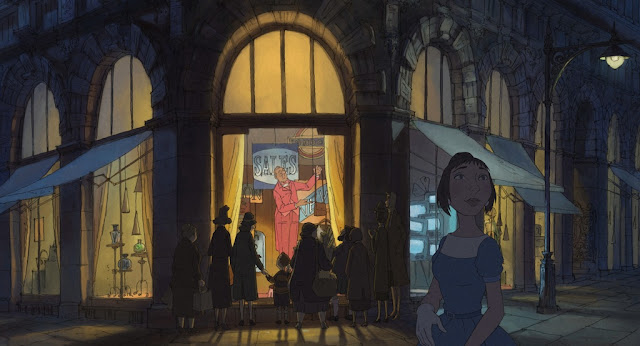December 27, 2010 [The Illusionist]
Like Sylvain Chomet's The Triplets of Belleville, The Illusionist is a finely drawn, essentially silent film—albeit a musical—that rescues the term "whimsical" from embarrassed triviality. But that's only part of the pleasure: It's based on a screenplay by Jacques Tati, and I'd read that it refers to a daughter whom Tati had abandoned.
The film doesn't confront what must be the sad, perhaps even villainous heart of such abandonment—but I didn't expect it would. Tati never confronted anything directly in his films, not even the House of Tomorrow in Mon Oncle, whose surfaces he merely ran restless fingers along and flipped a telling switch or two in order to expose Tomorrow's shortcomings. Even his "slapstick" can barely live up the term: It is physical, often involving something getting dismantled, but it occurs plainly, quietly, methodically—like M. Hulot's wardrobe, as though the excesses of baggy-pants comedy had been trimmed to fit the contours of a paunchy stork—which, given Tati's physique, it certainly had to be.
That figure appears again in The Illusionist as a broken-down magician unable to withstand the upheavals of early-1960s pop culture, especially within his profession—more precisely, the small clubs that formed the venue for his act. Pushed out by yeah-yeah-yeah mop-tops, the magician languishes—until he is "adopted" by a young woman/older girl—who has her needs, shoes and nice clothes and freedom and eventually a boyfriend—and the magician does what he can on all fronts—except for the boyfriend part. Their relationship is not romantic, but not quite father-daughter—well, not so that he would admit it, at least not until he sees he will lose her.
If this is somehow Tati's attempt to explore his actions against his daughter, to reconcile himself with her—or maybe just himself to the abandonment, to the fact that he would do such a thing—again, if The Illusionist wants to confess and atone, it does so in such an oblique manner that it becomes not only ephemeral but essentially Tati-esque. It's drawn the way Tati's films are paced: sketched lines, soft corners, warm, precise light—all for the sake of melancholy—or maybe something more: the comedy of departure. Knowing what Tati had done, and loving all his films, I felt The Illusionist growing sadder and sadder. It made me feel sorry for both of them, and also certain that nothing could be done to right the wrong—just maybe a quiet release, the moment when he lets the girl go and accepts his loneliness.
That's what it leaves me: a sad sad sad cartoon, a memory of the worst thing a parent can do and still leave everyone standing quietly in a beautiful but yellowed pool of light.
The film doesn't confront what must be the sad, perhaps even villainous heart of such abandonment—but I didn't expect it would. Tati never confronted anything directly in his films, not even the House of Tomorrow in Mon Oncle, whose surfaces he merely ran restless fingers along and flipped a telling switch or two in order to expose Tomorrow's shortcomings. Even his "slapstick" can barely live up the term: It is physical, often involving something getting dismantled, but it occurs plainly, quietly, methodically—like M. Hulot's wardrobe, as though the excesses of baggy-pants comedy had been trimmed to fit the contours of a paunchy stork—which, given Tati's physique, it certainly had to be.
That figure appears again in The Illusionist as a broken-down magician unable to withstand the upheavals of early-1960s pop culture, especially within his profession—more precisely, the small clubs that formed the venue for his act. Pushed out by yeah-yeah-yeah mop-tops, the magician languishes—until he is "adopted" by a young woman/older girl—who has her needs, shoes and nice clothes and freedom and eventually a boyfriend—and the magician does what he can on all fronts—except for the boyfriend part. Their relationship is not romantic, but not quite father-daughter—well, not so that he would admit it, at least not until he sees he will lose her.
If this is somehow Tati's attempt to explore his actions against his daughter, to reconcile himself with her—or maybe just himself to the abandonment, to the fact that he would do such a thing—again, if The Illusionist wants to confess and atone, it does so in such an oblique manner that it becomes not only ephemeral but essentially Tati-esque. It's drawn the way Tati's films are paced: sketched lines, soft corners, warm, precise light—all for the sake of melancholy—or maybe something more: the comedy of departure. Knowing what Tati had done, and loving all his films, I felt The Illusionist growing sadder and sadder. It made me feel sorry for both of them, and also certain that nothing could be done to right the wrong—just maybe a quiet release, the moment when he lets the girl go and accepts his loneliness.
That's what it leaves me: a sad sad sad cartoon, a memory of the worst thing a parent can do and still leave everyone standing quietly in a beautiful but yellowed pool of light.



Comments
Post a Comment